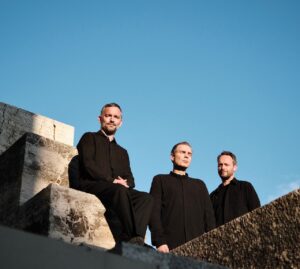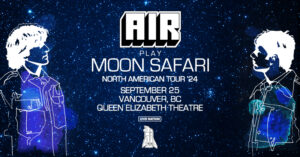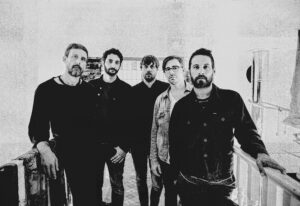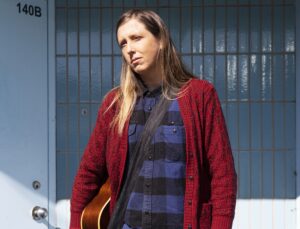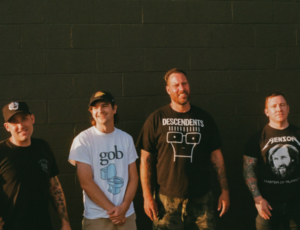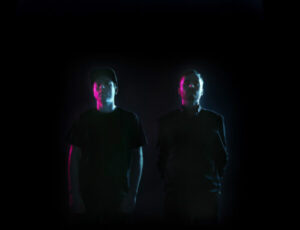This Rifflandia, I was lucky enough to sit down with four members (Nick Ward, Philip Kobernik, Matt Bishop and Colin Richey) of the six-piece Seattle-based “folkestral” band Hey Marseilles. This was their first year playing Rifflandia, and what follows is a conversation that reveals them to be a modest and thoughtful bunch. After being escorted to our designated interviewing spot, the band’s dressing room, we dove right into it.
Vancouver Weekly: Your band has strong similarities to bands like the Great Lake Swimmers and Mumford & Sons. Do you like being considered to be in the same category as them, or does it make you feel pigeonholed?
Nick Ward: I don’t think it makes us feel pigeonholed, by any means. When we started playing music, more or less before those bands came into awesome popularity, we just started playing music without an idea of what we were going to sound like, and it just ended up sounding like it did. It’s been fun to see how people have described our music, because when you’re in the depths of it you lose context of what it sounds like to somebody who’d probably heard it for the first time, so I enjoy hearing the comparisons, because they’re really usually quite varied and it’s always fun to see how somebody else sort of views the music that you create.
Philip Kobernik: Also, Mumford & Sons on Pandora station gets a lot of play. That band gets us a lot of play. Thanks Pandora. And Mumford & Sons.
Matt Bishop: By making us money.
I’m not sure what Pandora is.
MB: It’s like an internet radio thing, like Spotify, and you can create a channel, like the Mumford Channel? We get played on that channel, because people want to hear bands like the bands they like.
So you have a good attitude about it then…
NW: We try and have a positive attitude about most things.
PK: Just as long as Mumford & Sons don’t start getting wacky you know, and start like, clubbing baby seals or anything…
[laughter]
What’s a musical influence for you that might not be obvious from your sound alone, like maybe lyrically?
MB: Ah, when you say musical influence, you mean…?
I mean people are influenced, when they play music, by other musicians, and people decide who you’re influenced by often just by hearing you; but I was just wondering if you get any inspiration, in how you write lyrics, from anybody else?
MB: Yeah, I mean lyrically, there’s probably a lot of ways we can answer that because we all kind of contribute very different elements to the songwriting process, but lyrically I used to study a lot of contemporary poetry, so in terms of how I write and structure lyrics and rhyme schemes, and kind of the attitude behind a lot of postmodern contemporary American poetry is something that I draw from, witticisms; just taking that into the singer-songwriter genre has always been my influence lyrically. But we all come from pretty different places musically.
Do you have a location that you haven’t played yet that you’d really like to play?
NW: Europe. All of it.
Do you have any plans for that yet?
NW: There’s some talk about it in the cards, it’s probably going to happen, not for the next record… It’s uncertain.
MB: We don’t have any distribution in Europe yet, so.
PK: We’re trying to get a sense, like a definite hold on the dollar amount that we’re willing to lose on a trip to Europe.
Do you have a preference between playing shows in your hometown or playing shows on the road, like this festival?
NW: The funny thing is, I historically have liked playing shows in my hometown – it’s fun, there’s a better draw as it’s our friends. But recently, the shows in our hometown have been getting increasingly larger. There’s pressure when you’re playing in front of all our friends, so I kind of like playing shows out of town now a little bit more. That’s just me.
MB: They’re both kind of necessary.
Yeah, I’m sure there are good things about both.
MB: Yeah it’s just for different reasons. It’s fun to be able to show up somewhere you’ve never been before and have two hundred people there, but it’s also good to play in Seattle. We were really excited the first time we had a Sunday night gig where not very many people showed up, and now we can sell out 1200 capacity venues. That’s a different kind of accomplishment. Both are good.
So, I don’t know if this is too personal, but, being a band with quite a few members, you must have all gotten quite good at working together. Do you feel like being in this band and having to learn to work together has given you the opportunity for personal growth as individuals?
MB: It is very personal!
Colin Richey: I started playing in the band because I liked hanging out with them.
MB: Ha ha, he didn’t like the music at first!
Really??
CR: No, I thought they were good people, and they were really positive and that was something I wanted to be around. But now I like the music.
Oh that’s good, that’s important too.
NW: It took a couple of years for him to come around…
MB: I’d say yeah, to that. Creative endeavours are such a different world than everything else I’ve done in my life, in that there’s no measure, there’s no black and white measure of success. So putting yourself in an environment where you’re working with people to try to accomplish something that you’re not really sure is good – tests all kinds of personal strengths in terms of patience and you just question confidence, and interpersonal reactions, having to work together. It’s been probably one of the greater parts of my growth as an individual.
NW: Yeah absolutely, to answer the question, I think yes, it has, quite a bit.
Do you have a favourite kind of atmosphere to play in? Like a small intimate room versus an outdoor festival like this one. Do you feel like one of those is better suited for you music? Or you’re just so versatile you can do it all?
MB: We’re so versatile.
NW: Swiss-Army knife hands.
MB: Festivals can be really cool I think. This one, we’ve found really comfortable. At least I did, onstage, because it’s so hectic, you know, don’t have a lot of time to play, and you only have fifteen minutes to set up between sets. So I think we really thrive in a pretty versatile array of environments. Also I personally like when we’re in a space maybe in a theatre, or a larger club where we can really appreciate the smaller, quieter moments, but we also have the opportunity to rock out when the time comes.
PK: I’m consistently impressed and find myself appreciating kind of the dynamic abilities of the group because our show changes so much between context. We played – within the span of a few days – we played a show, Lollapalooza, which was, like, very much rocking out and a lot of kind of energy from the crowd, and so that made us feel energized and it was a very kind of raucous performance. A few days later it was like a house show living room where it was very close, like kind of like how we’re sitting together now, just very very close and intimate and we play our music very very differently and kind of interact with each other musically very differently. I think that’s a strength of the band.
So you have like, a fluidity, kind of?
MB: I think it keeps it, also, more entertaining for us.
So those of you who are staying to see more music, is there anybody in particular in this festival you’re looking forward to seeing?
NW: Wavves and Death From Above 1979 are my two ones that I go like this for in anticipation [gestures excitedly]
PK: I would be stoked to see Big Boi tomorrow, but I have a feeling I won’t be here.
NW: Who’s closing the festival tomorrow?
MB: Edward Sharpe and the Magnetic Zeros.
NW: I would like to see that.
Okay, well, I don’t have any more questions.
MB: Those were great questions, thank you.
Oh thanks.
Check out Hey Marseilles’ video for “Heart Beats”:
[youtube]http://www.youtube.com/watch?v=mc7jTzgrWBI[/youtube]



